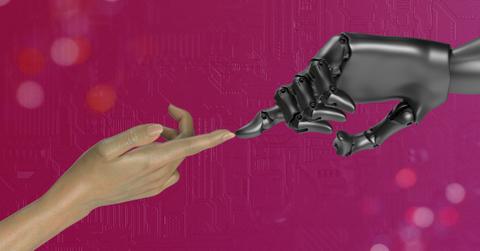What Does It Mean if Someone Calls You a "Slopper"? The New AI Slang Is Ominous
"Sloppers" joins new AI slang alongside "clankers," "botlickers," and "slop."
Published Aug. 18 2025, 9:59 a.m. ET
Twenty years ago, if you would have told people that one day, artificial intelligence (AI) programs would be ensconced in nearly every room of our houses, you would laugh. It sounds like something out of a Ray Bradbury short story, or Larry Niven's fanciful tale-telling.
Yet this is what most people live like today in the modern world. Whether you have an Alexa at every turn or just the cell phone device in your hand, you have AI ready for instant access with just a few clicks or voice commands.
For some people, this ever-present nature has led to an unfortunate habit that sees them being labeled with the slang word "slopper." What exactly is the meaning of "slopper," and what does it have to do with AI? Here's what we know.
What is the meaning behind the AI slang word "slopper"?
As the old saying goes, the key to nearly everything is moderation. Too much of a good thing, even a really good thing, can be bad. But for people deemed "sloppers," the "good thing" they have too much of is AI.
According to a TikTok user who first sparked discussion of the term, "A friend of mine has coined the word 'sloppers' for people who are using ChatGPT to do everything for them. That's incredible verbiage."
And we don't necessarily mean people who use AI for scheduling or to help them remember daily tasks. But for "sloppers," AI permeates nearly every aspect of their life.
If it's time for dinner, they won't choose something without asking their trusty AI assistant for input. They might even rely on the AI chatbot to determine whether they're even hungry, because they've come to trust the quick and logical-seeming responses more than their own instincts.
"Slopper" has joined a growing list of AI-centric slang terms meant to target those who are falling deeply into the world of AI and seem to be leaving humanity behind. "Slop," for instance, is an AI-generated video or artwork that comes from low-effort generative AI and is used for clickbait or engagement, Futurism explains. "Clankers" is a term often seen on social media that refers to the AI programs themselves. "Botlicker" is fairly self-evident.
And it doesn't stop there.
Is too much AI a bad thing?
It seems like "slopper" is an unusual thing to call a person, but many believe it's even more unusual for people to rely so heavily on AI that they can't make their own decisions. So why does that happen? After all, most people were able to make their own decisions prior to the advent of AI, so why the sudden influx of people crippled by indecision without the input of a computer program?
The "slopper" lifestyle seems to walk elbow-in-elbow with a new phenomenon identified as "AI psychosis." According to Psychology Today, “AI psychosis” is a growing phenomenon where individuals form delusional beliefs based on interactions with chatbots. People who already suffer from mental health issues are perhaps even more vulnerable to this condition.
While the idea behind "sloppers" isn't quite as intense as "AI psychosis," it does seem to be an issue for people who might already have issues with things like anxiety or depression, where they can find themselves paralyzed by indecision.
Artificial intelligence should improve the lives of humanity and make it easier to accomplish tasks that humans might struggle to do efficiently. However, like most new shiny toys, it's easy for humanity to forget that boundaries are important and stay up way too late playing with their new toy.
Somewhere down the line, rules, regulations, and laws will need to come into play to help people back it up a few steps and find a healthier balance between AI and the real world.
For now, the best thing to do is remember that most people are capable of making decisions on their own. Even if you feel particularly reliant on AI to help you make decisions, you're capable of far more than you give yourself credit for.
If you feel as though you are overly reliant on AI, speaking to a mental health professional is an excellent first step in determining what help you might need.
And remember: AI is still not using original thoughts, nor is it conditioned for critical thinking. Generative AI, also called "GenAI," learns patterns from data that already exists on the internet, Science News Today writes. A term used colloquially on social media for AI that is perhaps more appropriate than "clankers" would be "secondhand thinkers."
Nearly everything an AI program feeds back to users is generated from previously input data and is often reinforcing the bias the program has of wanting to please you, the user. So, consume with caution and maybe dial up your best friend next time you need some critical thinking skills applied to your plans for the future.

